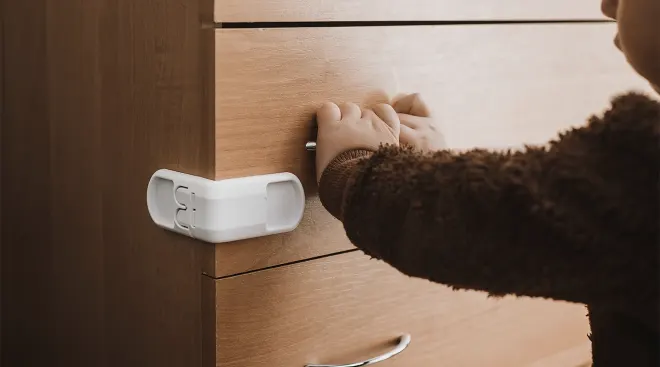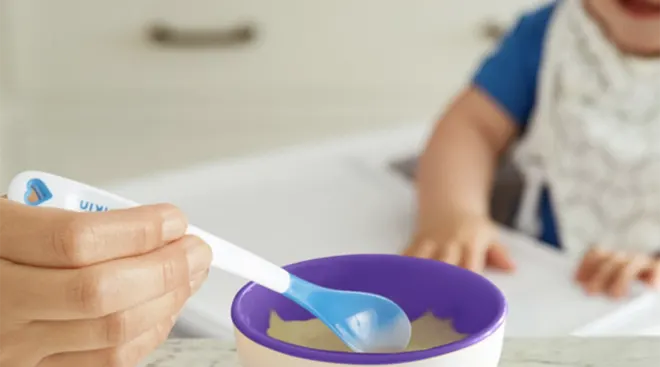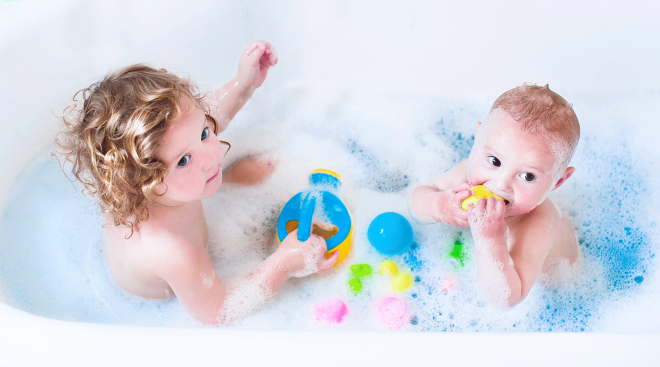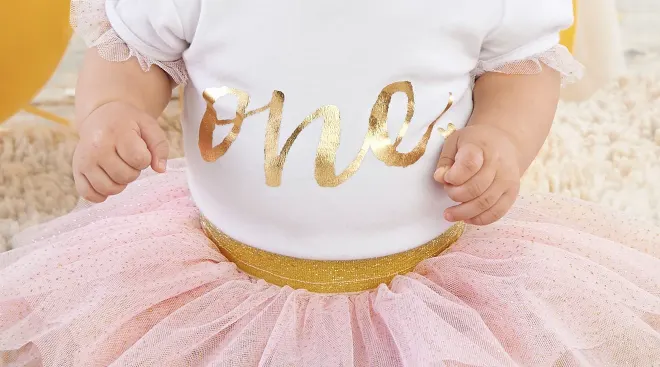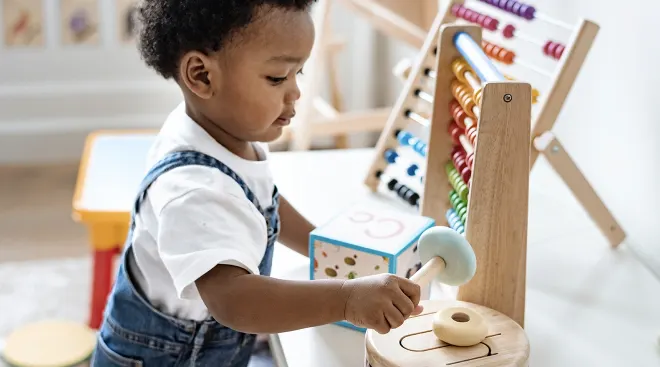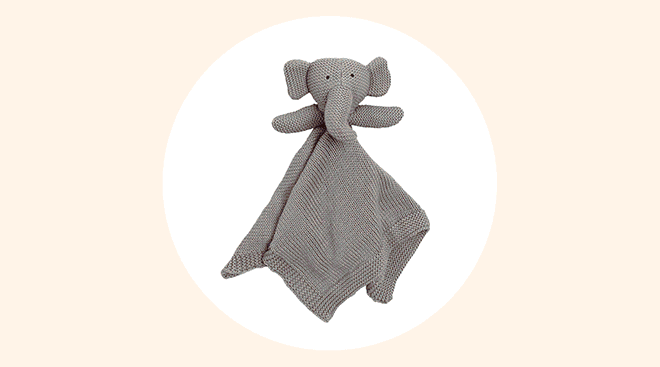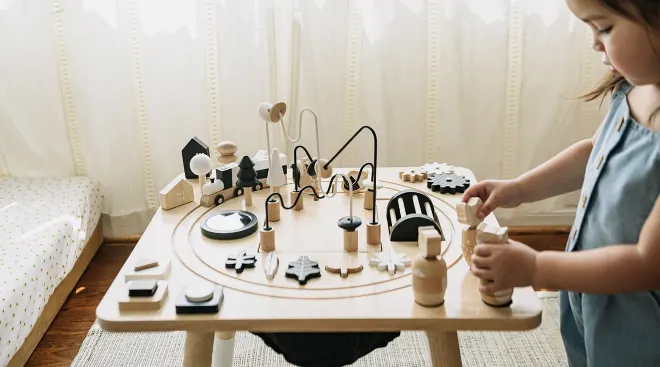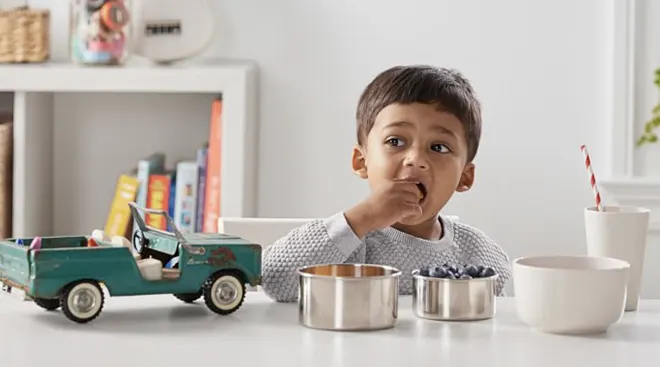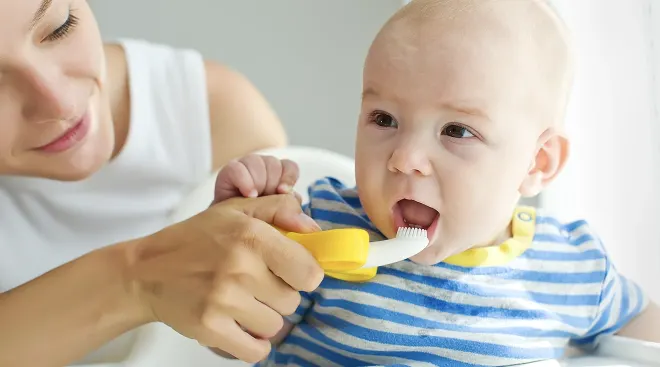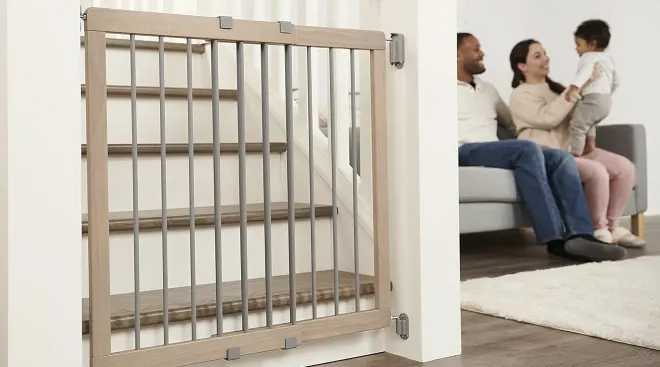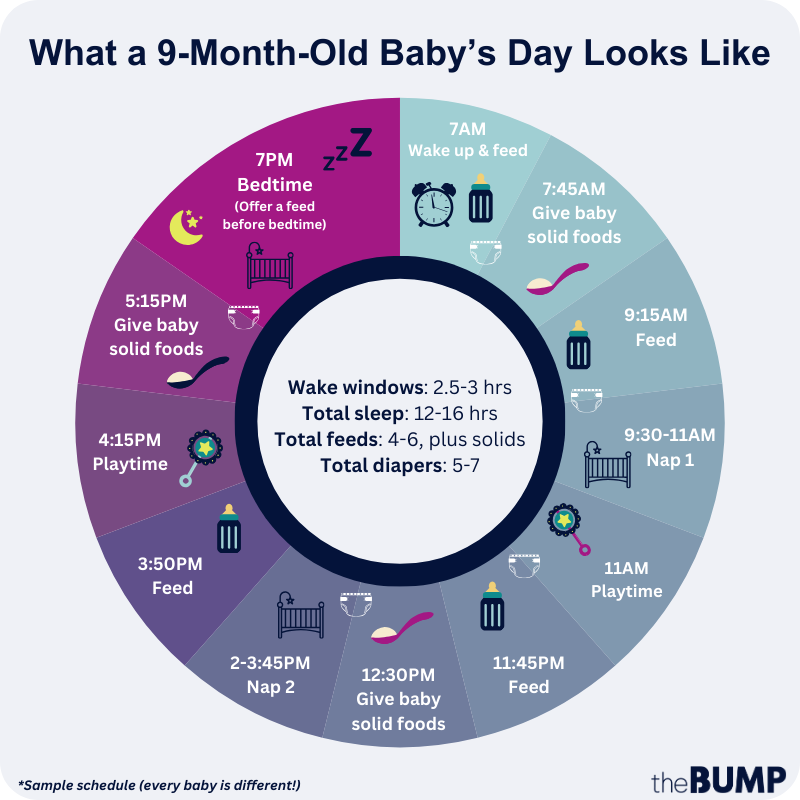9-Month-Old Baby

Look at all that baby has achieved! Your 9-month-old baby is probably sitting up, working on crawling and pulling up to stand, clapping and feeding themselves with their hands. (And don’t forget those precious babbles that are sounding more and more like words!) With these new abilities, life has become an adventure for baby—and for you. Your resourceful baby may use furniture and other objects for support while moving around a room. As usual, keep your eyes on your little one at all times, because they’re surprisingly fast and can easily take a tumble, since they’re still mastering their balance skills.
You may feel more comfortable in your skin as a caregiver now, but that doesn’t mean you don’t have questions surrounding this new phase in baby’s life. As baby continues to grow and develop, you’re likely wondering if they’re hitting all the 9-month-old baby milestones. Read ahead for what you need to know about baby’s development this month.
- Your 9-month-old is getting a lot more active! At this age, baby might start to crawl, and might even hold on to furniture to “stand” themselves up. This is all in preparation for walking!
- Baby might say their first word this month—and if they haven’t, they’re likely babbling away.
- As they start eating more solid foods, baby’s pincer grasp—aka ability to pick up things with their thumb and forefinger—is developing, which means you can serve them smaller pieces of food.
Baby isn’t just developing quickly, they’re growing by leaps and bounds! In fact, baby might just shoot up like crazy this month. It’s common for some babies to have a growth spurt around 9 months. Baby’s likely growing nearly half an inch this month and gaining three to five ounces each week.
We know you’re wondering: How much should a 9-month-old weigh? The average weight for a 9-month-old baby is 18.1 pounds for girls and 19.6 pounds for boys. The average length is 27.6 inches for girls and 28.3 inches for boys, according to the World Health Organization. Of course, height and weight can vary widely between healthy babies, so as long as baby’s growing at a healthy rate—on a steady curve on the chart at the doctor’s office—and the pediatrician doesn’t flag a problem, their growth is right on track.
There are plenty of exciting things happening at 9 months old. So what should a 9-month-old be able to do? Remember, some babies are quick to learn certain skills, while others prefer to take their sweet time. While each baby is different, here are some 9-month-old baby milestones they may be working on:
- Crawling. Nine months is the average age babies start to crawl, which means yours might have been doing it for a while, or you’re still waiting for them to start. A 9-month-old not yet crawling isn’t typically a cause for concern. In fact, doctors say some perfectly healthy and well-developed babies never crawl at all—they jump straight to walking! If you haven’t already, this is your reminder to babyproof your house asap.
- Standing. Your 9-month-old baby may be able to hold on to the couch or coffee table to stand themselves up. Next comes cruising, which means walking around with the support of the furniture. You know what comes after that!
- Sitting. What’s most fun to a 9-month-old might be sitting for long periods of time, playing with toys and objects. Your baby loves to use their hands to do just about everything!
- Pincer grasp. Nine-month-olds may begin to pick things up using their pointer finger and thumb—known as the pincer grasp. This really comes in handy when feeding and playing.
- Babbling. Most 9-month-old babies make sounds like mamamama and dadadada—they may even use them to describe their parents. First comes babbling and then comes talking! Keep listening as baby might say their first word now if they haven’t already.
- Growing teeth. You’ve probably noticed baby teething. How many teeth should a 9-month-old have? It really depends on baby. Some babies will have multiple teeth at this point, others none at all. The upper and lower incisors are usually the first to appear. You can expect to see them coming in around the following ages:
- Lower central incisor: 6 to 10 months
- Lower lateral incisor: 10 to 16 months
- Upper central incisor: 8 to 12 months
- Upper lateral incisor: 9 to 13 months
If baby’s not doing everything other 9-month-olds are doing, it isn't a reason to worry. But there are certain things that could be signs of a developmental delay. Tell the pediatrician if baby:
- Doesn’t put weight on their legs when you hold them upright above a surface.
- Doesn’t sit with propping or holding.
- Doesn’t babble sounds like “mama,” “baba” and “dada."
- Doesn’t play games that require back-and-forth play.
- Doesn’t respond to their name.
- Doesn’t seem to recognize familiar people.
- Doesn’t look where you point.
- Doesn’t pass toys from one hand to the other.
9-month-old sensory development
Baby’s vision keeps getting better. Now they can see well across the room. They can easily recognize familiar faces and objects. By now, there’s a good chance they have a favorite toy or stuffed animal.
Baby knows there are things they can’t see—that’s called object permanence. They’ll remember a toy and look for it. Baby can recognize familiar sounds too. They may understand words they hear often, such as no, bottle, mama and dada.
“At 9 months of age, an exciting new skill develops that changes the way we safely serve solids to our child: Babies typically start to develop the pincer grasp. This is the ability to pick up small pieces of food using their thumb and forefinger, which means that we transition away from serving food in large pieces and move toward serving small bite-sized pieces. All foods provided to children during 6 to 12 months of age should be soft and easily smushable—think banana, sweet potatoes, butternut squash or avocado consistency. Foods should be able to be easily mashed between the gums or melt easily in their mouth.” — Cinthia Scott, RD, IBCLC, pediatric registered dietitian
As baby grows, your questions about their health are likely changing. Here are some topics you might be curious about at the 9-month-old stage.
Acupuncture for baby
Acupuncture is generally considered to be safe for babies and can be used to treat a range of conditions. It’s also generally painless, although baby might feel tingling. Be sure to speak with your pediatrician about your goals and find a reliable provider.
How to deal with bug bites
Since your little one is more active, they might be outside more—and more susceptible to bug bites. Bites from insects like mosquitoes or chiggers usually cause red, itchy bumps, while bites from insects like horse flies or fire ants can cause red, painful bumps. You can usually treat bug bites at home by applying some anti-itch cream like hydrocortisone cream—don’t give an allergy med like Benadryl to a 9-month-old without speaking to your doctor. You can press on a painful insect bite with a cold cloth or offer Tylenol (acetaminophen) or Advil (ibuprofen). If baby’s developing a bad rash or some sort of allergic reaction, contact your pediatrician.
Water safety
Babies at this age can drown in as little as one to two inches of water, so it’s really important to be aware of their activity in the water at all times, whether it’s in a bathtub or pool. Never leave a little one unattended in the water and always keep your hand on them in some way. Use a waterproof thermometer to make sure the temperature is comfortable—it should be no more than 120 degrees Fahrenheit. Outside of the bath or pool, be sure to keep toilet lids closed and the shower drain unplugged, just in case baby wanders into the bathroom to explore.
Ear infections
Ear infections are caused by inflammation in the middle ear and are extremely common among babies and toddlers. Because their tubes and respiratory system are so small, fluid can quickly and easily build up behind the eardrum and cause that inflammation, which is especially common if baby has had a sore throat, cold or other upper respiratory infection. Babies that have an ear infection will typically have trouble sleeping, run a fever and tug on their ear, but that’s not always the case—sometimes symptoms can be more subtle. Some ear infections require antibiotics to heal, while others may go away on their own. The American Academy of Pediatrics (AAP) recommends that at 9 months old, parents always make the decision on how to treat an ear infection with a pediatrician.
Checkup and vaccines
Baby’s 9-month-old checkup is likely their first check-up since their 6-month visit, which is exciting. You can expect the pediatrician and nurse to take their weight and height, do a screening test to help identify developmental delays, do a full physical exam, order a blood test for lead exposure or anemia and update vaccines. While vaccine schedules can vary depending on what state you’re in, your little one will probably receive their final dose of the hepatitis B vaccine (HBV) and/or a third dose of the inactivated polio vaccine (IPV).
Hello, independent baby! If baby drinks from a bottle, they might be able to hold it themselves by now. This would also be a good time to introduce a sippy, straw or open cup. As for solid foods, they’re probably into the idea of eating those independently too.
How much should a 9-month-old eat?
- Breastfeeding: Feedings are still typically about every three or four hours, but each breastfed baby may be slightly different. What’s important is that baby seems content, your breasts seem to have been emptied (they’re soft) and your child is gaining weight healthily.
- Bottle-feeding: How many ounces should a 9-month-old drink? It should total about 24 to 32 ounces in a 24-hour period. In other words, if baby has a bottle six times per day, they should each have about four to six ounces of formula in them.
- Pumping: A breastfed baby needs about 25 ounces of breast milk per day—so you’ll want to divide that by how many feedings baby typically has.
- Solid food: If you’re wondering what to feed a 9-month-old baby, it’s simpler than it may seem. Baby should have three small meals plus two snacks (kind of like you!), and doctors recommend feeding baby whole foods, without much that’s processed or has added sugar or salt. Give baby a variety of foods in different food groups and different colors of the rainbow: yellow bananas, red peppers, green avocado, orange sweet potatoes, white tofu, brown whole grain cereal. Baby should be getting protein, carbohydrates and fats in every meal. Plus, baby should have been exposed to the top allergens at this point—unless your pediatrician has advised against this.
Nine-month-olds are working on their pincer grasp, so finger foods are a go. Offer their favorite soft-cooked veggies cut into small pieces, bits of banana or avocado, or tiny cooked pasta pieces. You also can’t go wrong with plain Cheerios (or something similar).
To double-check that baby’s getting enough breast milk or formula, you can check their diapers. How many wet diapers for a 9-month-old is healthy? About four or five very wet ones per day is considered ideal.
The thing that’s constantly on parents’ minds: Sleep! Here’s what you should know about sleep at 9 months old.
9-month-old sleep schedule
Nine-month-old babies typically sleep about 14 to 15 hours per day. Eleven hours of those are at night. About three hours are divided between two daytime naps.
Why is my 9-month-old not sleeping through the night?
About 70 percent of 9-month-olds sleep 8 to 12 hours at night without waking. But don’t let the fact that your baby isn’t part of the majority get you down—there are ways to help baby sleep through the night. If you think your child needs a little extra nudging to start sleeping longer stretches, you can consider sleep training.
Sleep regression can be common among 9-month-old babies. Because your child is learning new skills, such as crawling, pulling up to stand and cruising, they might decide they want to practice them… in the middle of the night. Some older babies might decide they simply miss their parents! The good news is, babies tend to grow out of regressions like this within a month or two. Until then, use some of these tricks to try to help baby (and you!) get more restful sleep.
As baby gets more mobile and their wake windows stretch, their 9-month-old sleep schedule and feeding schedule change too. Here’s an example of what a 9-month-old’s day looks like.
Nine-month-olds might be awake for about 10 hours per day, and they’re likely more active than ever! You’re probably looking for ideas of things to do with a 9-month-old baby. Check out this list of baby activities that’ll give you an idea of things to do now, plus more below:
- Nine-month-old babies love adventure! Create a mini obstacle course with cushions baby can climb, scoot and cruise over and around to help them experiment with their movement skills.
- Baby is in the very early stages of learning the meanings of words. You might be surprised that 9-month-old babies can understand some commands already. Experiment with certain phrases like “please give me the toy,” and provide them with plenty of praise when they correctly complete a request.
- Read, read, read. Your diligent mini scholar loves being read to—by you! You're their favorite storyteller, so get out some new board and picture books and enjoy!
- Baby loves interactive toys, but you don't need anything fancy or electronic. They love items with buttons and knobs they can press and turn!
You’ve got this! Here’s how to take care of both yourself and baby during this busy month.
Postpartum recovery tips
- Focus on increasing nutrients if you’re breastfeeding. According to the Centers for Disease Control and Prevention (CDC), breastfeeding moms need 340 to 400 more calories every day than they consumed before pregnancy. You can track your calories or simply try to eat more than usual to keep up with that. You should also focus on adding nutrients like iodine and choline into your diet, since the needs for those increase when breastfeeding. You can do this by eating dairy products, eggs, seafood, meats, beans, peas and lentils.
- Rely on a support system. Research supports the idea that moms need support, encouragement and praise to feel more confident in their parenting skills and assistance with various daily tasks. Don’t assume that just because baby’s getting older, you can do it on your own. A support system can include a group of friends and/or family members you trust, doctors and/or therapists who provide physical and mental postpartum care and support groups for mothers in similar situations. Whoever your support system is, continue to rely on them whenever you need an emotional boost or help with a tricky situation. Set up a group chat for quick texts and questions, reach out and call someone to vent once a week or have a go-to person who can help you with your child when needed.
9-month-old baby care tips
- Socialization with other babies. At 9 months old, babies really don’t know how to play together—they’re more likely to play side-by-side, aka parallel play. But that doesn’t mean you shouldn’t book playdates! Your little one is also starting to experience some separation anxiety and may be wary around new people in public, clinging to you a little more than usual. To get them comfortable around other babies and kids, stay by their side, show them your there and let them lead a bit. Encourage them to be curious and explore while letting them know you’re there. You can also help baby learn more about back-and-forth interaction by playing with them and doing games like peek-a-boo.
- Can you spoil a baby? Nope! There’s zero scientific evidence that holding and cuddling your child or responding to their cries is spoiling them—or that you can spoil an infant at all. Responsive relationships between a parent and baby leave them feeling safe and supported; and those moments where you show that you’re there for them if they need you may actually make them less whiny in the long run. So feel free to give in to all of the snuggles and cuddles—they need it.
- Weaning from breastfeeding. At this point in your baby’s life, you might be ready to step back from breastfeeding. When you wean before a baby’s first birthday, the CDC recommends replacing their breast milk with formula until they have reached the 12-month mark. If baby’s been exclusively breastfed up until this point, you have to start introducing formula slowly so they can adjust. Stretch the amount of time between breast milk feeds, substituting their least favorite feeding with formula first. And focus on expressing milk as needed so you don’t get engorged and feel pain.
- Juice and sugary treats for babies. The AAP doesn’t recommend giving fruit juice to babies under 12 months, since it offers no nutritional benefit, can increase the risk of tooth decay and cause a preference for sweeter drinks instead of water. The AAP also recommends that children under 2 years old don’t eat anything with added sugar. They recommend limiting processed and pre-packaged foods and sugary snacks, instead offering fresh fruit for something sweet.
- Introducing new adults. At this age, baby is a little more aware of their surroundings and may experience some separation anxiety. To introduce them to new adults, show them that you’re there with them and aren’t going to leave. Help them feel supported and encourage them to interact with the other adult without pushing them. If you plan on leaving them alone with a new caregiver, try to stay with them at first so baby can start to feel comfortable with them while you’re around.
As parents, we love sharing our favorite advice to help others on their parenting journey. Here are a few triumphs, struggles and words of advice that may inspire you at the nine-month mark:
- Win: “I had a horrible, dark postpartum with my first, and with my second it’s been so vastly different. My postpartum anxiety was out of control and I would have panic attacks when people would even ask to hold him—basically jumping to a fight-or-flight mode in public settings or even just when my in-laws were around. I got some help through a therapist who specializes in postpartum anxiety and cognitive therapy. She worked with me on simple things to rewire my brain and use skills to work through each situation. It took some work and lots of learning, but I’m in a much, much better place now.” — knottie88db1ab4f6b60640
- Challenge: “What do you do when you have a 9-month-old who still doesn't really eat solids? I offer her solids twice a day—in the morning and in the early evening—and both times, I feel like I'm throwing away all the food I make for her. I started her on the basics at 6 months, but put them away for a while because she literally just gagged through each spoonful. It was awful… Since then, I’ve been religiously offering and trying to shove some in her mouth every now and again, but honestly she wants nothing to do with any solids whatsoever. I've even tried the baby-led weaning approach and it worked for about a week, but she lost interest. I would’ve really liked to be down to two or so sessions of breastfeeding at the one-year mark, but it doesn't look like that's going to happen.” — DreamsBride411
- Wisdom: “To help fix baby’s sleep schedule, first move bedtime by 15-minute increments… It's going to take time. Try to keep the house darker and quieter after dinner. Eight o'clock is the bedtime that has worked for our family of three kids. Sound machines can help too. Once you've used it for a bit, it doesn't just drown out smaller noises that could wake them up, but turning it on triggers sleep for the baby because they're programmed that way after a little while. Also, black-out curtains!” — annemarie96
“At 9 months old, sleep can get a little better—and then fall apart again. Be patient and recognize that different things work for different families. Your solution might be putting baby in their own room—or it might be putting baby back in your room so they can be closer to you. It might be a different bedtime routine, or having baby nap less (or more) during the day. Resist the urge to compare with other families—again, everyone is truly different.” — Natalie Gontcharova, Senior Editor, The Bump
Frequently Asked Questions
Is it normal for a 9-month-old to not have teeth yet?
Most babies start teething between 6 and 12 months old, with that first tooth typically popping out at 6 months old. But that doesn’t mean every baby will get their first tooth that young. If baby hasn’t gotten their first tooth by 9 months old, that’s perfectly fine and you don’t need to worry. Some babies get their first teeth later than others. That said, if your baby hasn’t gotten their first tooth by the time they’re one year old, you should contact your pediatrician or a pediatric dentist.
When can baby have honey?
Babies shouldn’t have honey until they’ve reached the 12-month mark. Honey can contain a bacteria that can cause infant botulism, which can weaken muscles and lead to poor sucking, a weak cry, constipation and decreased muscle tone. Check the ingredients of any food you give them carefully to ensure it doesn’t contain honey.
What is the 9-month peak?
The nine-month peak isn’t a scientific term—it’s just a term that some parents use that refers to the amount of cognitive and physical developments baby’s undergoing at that age. This includes social and emotional developments like being more reactive and expressive, language and communication milestones, like starting to say certain words or making more sounds, cognitive milestones like banging objects together and physical milestones like sitting on their own or scooting. All of these changes may leave your little one extra cranky and tired—but don’t worry, this too shall pass!
When should baby visit the dentist?
It’s recommended that a baby’s first dental visit happens at 12 months of age. The first visit usually includes an exam and a gentle cleaning, and can help baby become more comfortable with dental hygiene, like brushing their teeth and flossing. Dentists can also check for proper development and tooth decay.
Do babies get headaches?
While they might not be able to express exactly what’s happening to them, babies can get headaches—in fact, they can even experience a migraine. If your 9-month-old is very cranky, irritable or doesn’t seem like they’re feeling well, it’s always a good idea to reach out to your pediatrician.
Who knew that there could be so many 9-month-old baby milestones to look forward to? With each day that passes, your 9-month-old will continue to surprise you with their impressive growth, development and intelligence. Take it all in and have fun on this wild ride!
Please note: The Bump and the materials and information it contains are not intended to, and do not constitute, medical or other health advice or diagnosis and should not be used as such. You should always consult with a qualified physician or health professional about your specific circumstances.
Navigate forward to interact with the calendar and select a date. Press the question mark key to get the keyboard shortcuts for changing dates.
































